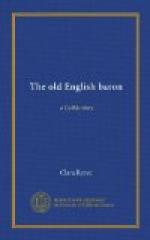The Baron once more summoned all his company together; he told Edmund all that had passed relating to his brother in-law, his exile, and the pilgrimage of Zadisky; he then related the circumstances of Sir Robert’s engagement to Lord Clifford’s daughter, his establishment in his uncle’s seat, and his own obligations to return time enough to be present at the marriage: “But before I go,” said he, “I will give my daughter to the heir of Lovel, and then I shall have discharged my duty to him, and my promise to Sir Philip Harclay.”
“You have nobly performed both,” said Sir Philip, “and whenever you depart I shall be your companion.”
“What,” said Edmund, “am I to be deprived of both my fathers at once? My honoured lord, you have given away two houses—where do you intend to reside?”
“No matter,” said the Baron; “I know I shall be welcome to both.”
“My dear Lord,” said Edmund, “stay here and be still the master; I shall be proud to be under your command, and to be your servant as well as your son!”
“No, Edmund,” said the Baron, “that would not now be proper; this is your castle, you are its lord and master, and it is incumbent on you to shew yourself worthy of the great things Providence has done for you.”
“How shall I, a young man, acquit myself of so many duties as will be upon me, without the advice and assistance of my two paternal friends? Oh, Sir Philip! will you too leave me? once you gave me hopes—”
He stopped greatly affected.
Sir Philip said, “Tell me truly, Edmund, do you really desire that I should live with you?”
“As truly, sir, as I desire life and happiness!”
“Then, my dear child, I will live and die with you!”
They embraced with tears of affection, and Edmund was all joy and gratitude.
“My good Lord,” said Sir Philip, “you have disposed of two houses, and have none ready to receive you; will you accept of mine? It is much at your service, and its being in the same county with your eldest son, will be an inducement to you to reside there.”
The Baron caught Sir Philip’s hand.
“Noble sir, I thank you, and I will embrace your kind offer; I will be your tenant for the present; my castle in Wales shall be put in repair, in the meantime; if I do not reside there, it will be an establishment for one of my younger sons.”
“But what will you do with your old soldiers and dependants?”
“My lord, I will never cast them off. There is another house on my estate that has been shut up many years; I will have it repaired and furnished properly for the reception of my old men: I will endow it with a certain sum to be paid annually, and will appoint a steward to manage their revenue; I will continue it during the lives of the first inhabitants, and after that I shall leave it to my son here, to do as he pleases.”
“Your son,” said Edmund, “will make it the business of his life to act worthy of such a father.”




